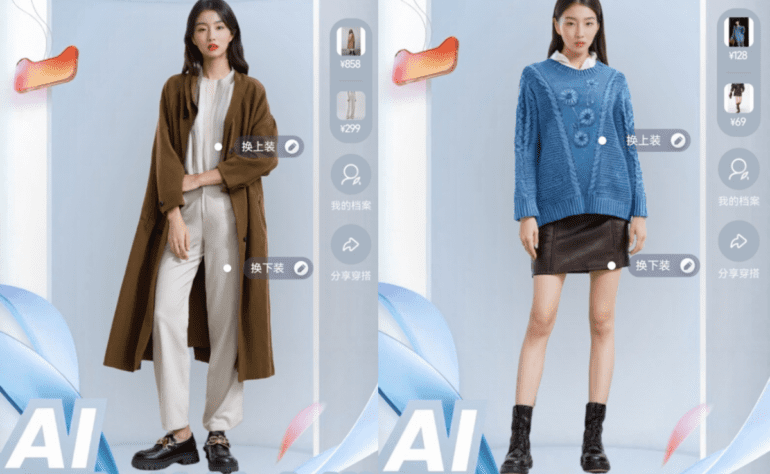TL;DR:
- AI was named Word of the Year in 2023, sparking discussions about practical applications.
- Alibaba Cloud demonstrated AI’s potential during 11.11 shopping festival.
- AI tools improved shopper experiences, personalized services, and boosted merchant efficiency.
- Taobao utilized Alibaba Cloud’s Large Language Model (LLM) for AI-powered customer service.
- Generative AI holds promise for consumer and retail sectors, as advised by KPMG.
- Alibaba Cloud aims to enable businesses to harness generative AI for innovation.
- Tongyi Qianwen enhances customer service chatbots, making interactions smoother.
- Generative AI automates tasks for merchants, aiding in 11.11 promotions.
- Taobao introduced a virtual try-on feature for a more immersive shopping experience.
- Energy Expert, an AI-based tool, helps brands reduce carbon footprints and inform consumers.
- Oatly and Brooks Sports used Energy Expert to certify their carbon reduction efforts.
Main AI News:
In 2023, Collins Dictionary named AI the word of the year, with its usage quadrupling. This surge in interest has ignited conversations about the practical applications of this groundbreaking technology. Among the sectors where AI’s influence was most pronounced was the retail industry, particularly during the world’s largest shopping festival, 11.11. During this event, AI tools took center stage, revolutionizing the shopping experience, enhancing personalization, and optimizing merchant operations for greater efficiency and sustainability.
Known as Singles’ Day or Double 11, this festival holds immense significance for companies, both large and small. An unprecedented number of businesses and brands invested in marketing campaigns across Alibaba Group’s Chinese marketplaces, Taobao and Tmall, during this shopping extravaganza.
China’s largest digital retail platform, Taobao, harnessed the power of Alibaba Cloud’s Large Language Model (LLM), Tongyi Qianwen, to cater to digitally savvy Chinese consumers and empower merchants with cutting-edge AI tools.
According to a recent report by KPMG consultants, generative AI stands as a potential game changer for the consumer and retail sector, capable of delivering superior business outcomes across various fronts. KPMG advises companies to deploy enterprise-class generative AI engines, enabling them to train securely on proprietary data.
Jingren Zhou, Alibaba Cloud’s CTO, articulated their mission, saying, “We aim to serve as an enabler for businesses across various sectors to harness the potential of generative AI and foster innovation within Alibaba’s ecosystem in generative AI model development and AI applications.”
Seamless Shopping Experiences
Alibaba Cloud introduced Tongyi Qianwen in April, with plans to integrate it across its ecosystem. One standout example is Alibaba’s Taobao and Tmall smart customer service chatbot, Ali Xiaomi, which relies on the LLM. This chatbot offers more personalized and precise responses to customer queries compared to traditional chatbots, thanks to the LLM’s natural language understanding capabilities. Moreover, it can seek clarifications when user queries are ambiguous, ensuring a smoother interaction.
The chatbot also assists users in navigating services such as order tracking and returns, significantly reducing wait times and service delays and thereby lowering dissatisfaction levels. Merchants on Tmall and Taobao also benefit from generative AI tools that automate daily tasks, from crafting headlines and drafting campaign copy to addressing questions about 11.11 promotion regulations. Tens of thousands of merchants utilized these tools to gain insights into running promotions during the highly competitive 11.11 sales.
Generative AI played a pivotal role in enhancing Taobao’s shopping experience by introducing a virtual try-on feature this year. Built using Alibaba Cloud’s proprietary AI model, this feature allows consumers to visualize how clothing would look in real life by uploading a selfie. Users can see how clothes stretch, cling, and fold on their bodies virtually. Since its beta testing began in June, over 500,000 users have embraced this innovative feature, making the shopping experience more immersive and informative.
A Greener Approach
During 11.11, brands and retailers also leveraged an AI-based tool known as Energy Expert to reduce their carbon footprint and provide consumers with insight into their carbon-reduction efforts. A consumer sustainability report commissioned by Alibaba Group earlier revealed that over three in four consumers appreciate information on environmentally friendly online purchases.
Alibaba’s cloud computing arm developed the software-as-a-service tool, Energy Expert, which measures greenhouse gas emissions. It employs deep learning-based AI models to analyze the carbon footprint of products, making carbon footprint modeling more efficient and precise. Additionally, it utilizes language models to generate industry insights on carbon emission reduction for corporate customers.
For instance, U.S. sports brand Brooks Sports successfully reduced the carbon emissions of its Ghost 15 running shoe collection by 1 kg per pair through the use of recycled materials. This is equivalent to the carbon dioxide produced by driving a small car for 4.88 km, as certified by Energy Expert. On product information pages on Taobao, consumers can access detailed carbon reduction certification information and earn points on Alibaba’s carbon ledger platform based on the amount of carbon emissions reduced.
Swedish food company Oatly also embraced Energy Expert during 11.11 to certify its raincoat, further emphasizing the importance of calculating carbon footprints at different production stages to encourage suppliers to reduce their carbon emissions.
Conclusion:
Alibaba Cloud’s showcase of AI’s impact on retail during the 11.11 festival highlights the transformative potential of AI in the market. From enhancing customer experiences to promoting sustainability, AI is becoming a key driver of innovation in the retail sector. Businesses that embrace generative AI and tools like Energy Expert can expect to stay competitive and eco-conscious in the evolving retail landscape.

